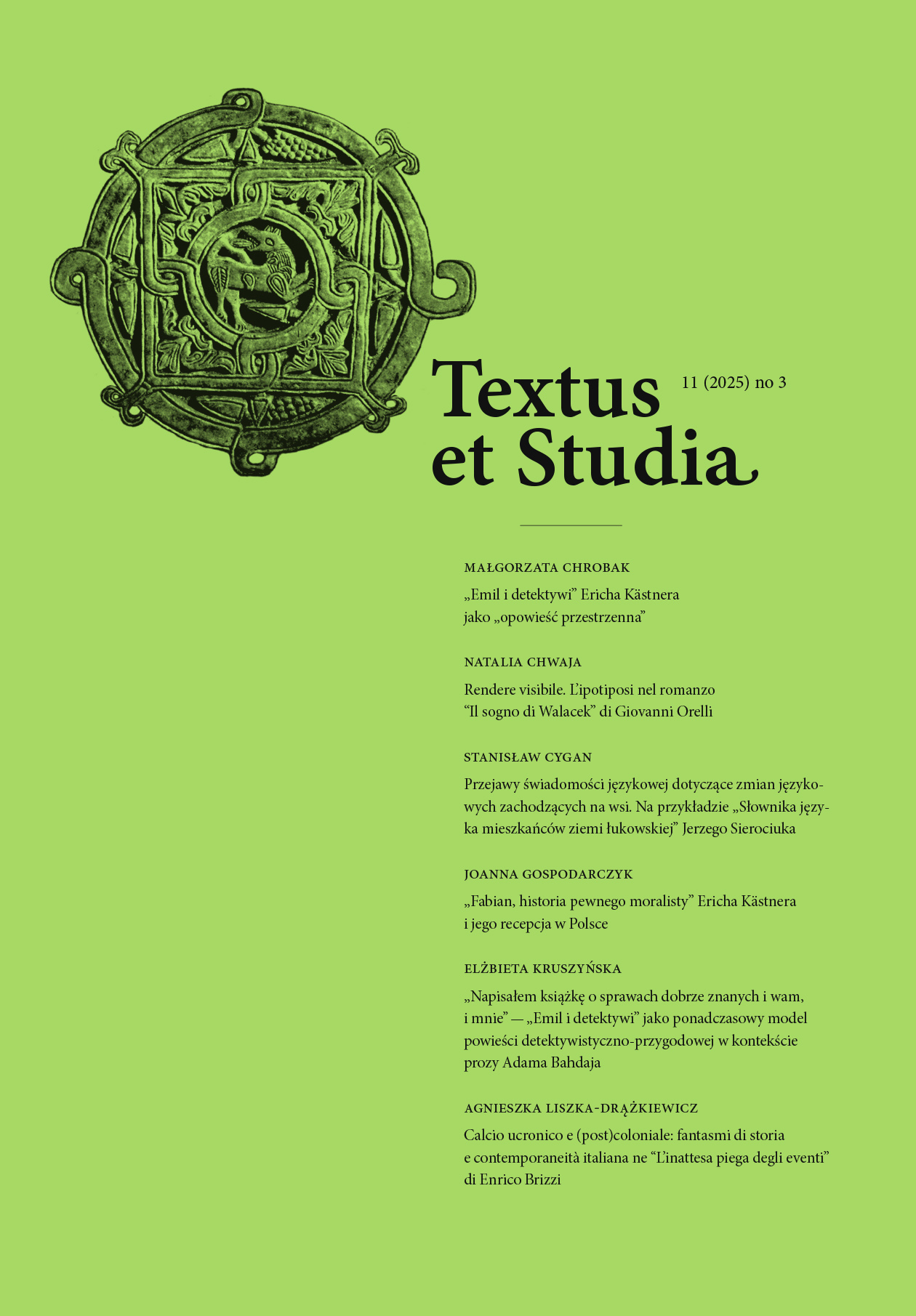Uchronic and (post)colonial football: spectres of history and contemporaneity in “L’inattesa piega degli eventi” by Enrico Brizzi
DOI:
https://doi.org/10.15633/tes.11309Keywords:
colonialism, postcolonialism, football, alternate history, fascismAbstract
Enrico Brizzi’s “L’inattesa piega degli eventi” (The unexpected turn of events) addresses the issue of Italy’s colonial and fascist past through the story of a journalist who is sent to cover the football series in the so-called Associated Republic of East Africa in the alternate 1960s. This article aims to show how the author uses both the alternate history subgenre and the cultural power of football to talk about Italy’s colonial past as well as its contemporary social problems. It analyses how the game of football, presented as an instrument of colonial oppression, also becomes a way to express dissent and rebellion. An attempt is then made to show how the novel polemises with a traditional positive view of fascist Italy prevalent in Italian alternate history narratives. An attempt is also made to demonstrate the similarities between the alternative past and the present to which the novel alludes.
References
Brioni S., Fantahistorical vs. fantafascist epic: “Contemporary” alternative Italian colonial histories, “Science Fiction Studies” 42 (2015) no. 2, p. 301–321.
Brizzi E., L’inattesa piega degli eventi, Milano 2019.
Brizzi E., Vincere o morire. Gli assi del calcio in camicia nera 1921–1938, Roma–Bari 2016.
Camilotti S., Cartoline d’Africa. Le colonie italiane nelle rappresentazioni letterarie, Venezia 2014.
Del Boca A., Italiani, brava gente? Un mito duro a morire, Vicenza 2005.
Del Monte S., Staging memory. Myth, symbolism and identity in postcolonial Italy and Libya, Berlino 2015.
Hobsbawm E., Introduction, in: The invention of tradition, eds. E. Hobsbawm, T. Ranger, Cambridge 1996.
Labanca N., Perchè ritorna la “brava gente”. Revisioni recenti sulla storia dell’espansione coloniale italiana, in: La storia negata. Revisionismo e il suo uso politico, a cura di A. Del Boca, Milano 2009, p. 61–106.
Marra E., Il caso della letteratura ucronica italiana. Ucronia e propaganda nella narrativa italiana, “Between” 4 (2014) no. 7, p. 1–10, https://doi.org/10.13125/2039-6597/1116.
Martin S., Calcio e fascismo. Lo sport nazionale sotto Mussolini, Roma–Bari 2006.
Martin S., Sport Italia: The Italian love affair with sport, London 2011.
Neumann B., Rupp J., Embodying the nation: Sport and memory in “Lagaan — once upon a time in India”, in: Postcolonial studies: Changing perceptions, ed. O. Palusci, Trento 2006, p. 127–142.
Ponzanesi S., Polizzi G., Does Italy need postcolonial theory? Intersections in Italian postcolonial studies, “English Literature” 3 (2016), p. 141–161, http://doi.org/10.14277/2420-823X/EL-3-16-8.
Serkowska H., “Cosa sapevo della Serie Africa? Niente di niente. E molto poco dell’Africa nel suo insieme”. La storia coloniale italiana nel racconto ucronico-sportivo, “Narrativa” 31–34 (2012), p. 353–363, https://doi.org/10.4000/narrativa.1470.
Wu Ming, New Italian epic. Letteratura, sguardo obliquo, ritorno al futuro, Torino 2009.
Downloads
Published
Issue
Section
License
Copyright (c) 2025 Agnieszka Liszka-Drążkiewicz

This work is licensed under a Creative Commons Attribution 4.0 International License.
Authors who publish with this journal agree to the following terms:
- Authors retain the copyright and full publishing rights without restrictions, and grant the journal right of first publication with the work simultaneously licensed under a Creative Commons Attribution 4.0 International License that allows others to share the work with an acknowledgement of the work's authorship and initial publication in this journal.
- Authors are able to enter into separate, additional contractual arrangements for the non-exclusive distribution of the journal's published version of the work (e.g., post it to an institutional repository or publish it in a book), with an acknowledgement of its initial publication in this journal.
- Authors are permitted and encouraged to post their work online (e.g., in institutional repositories or on their website) prior to and during the submission process, as it can lead to productive exchanges, as well as earlier and greater citation of published work (See The Effect of Open Access).

